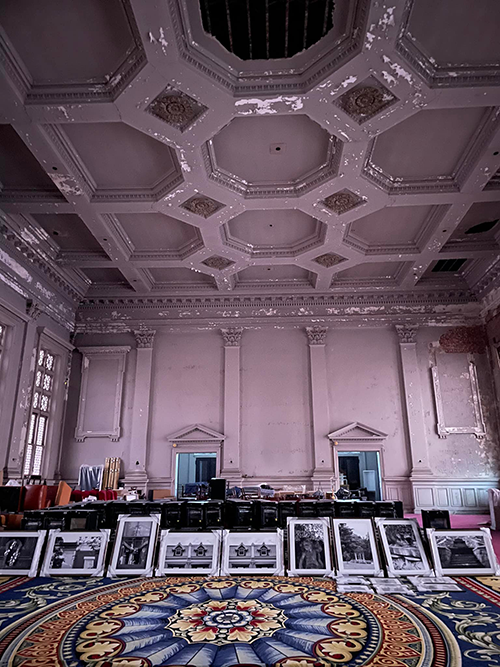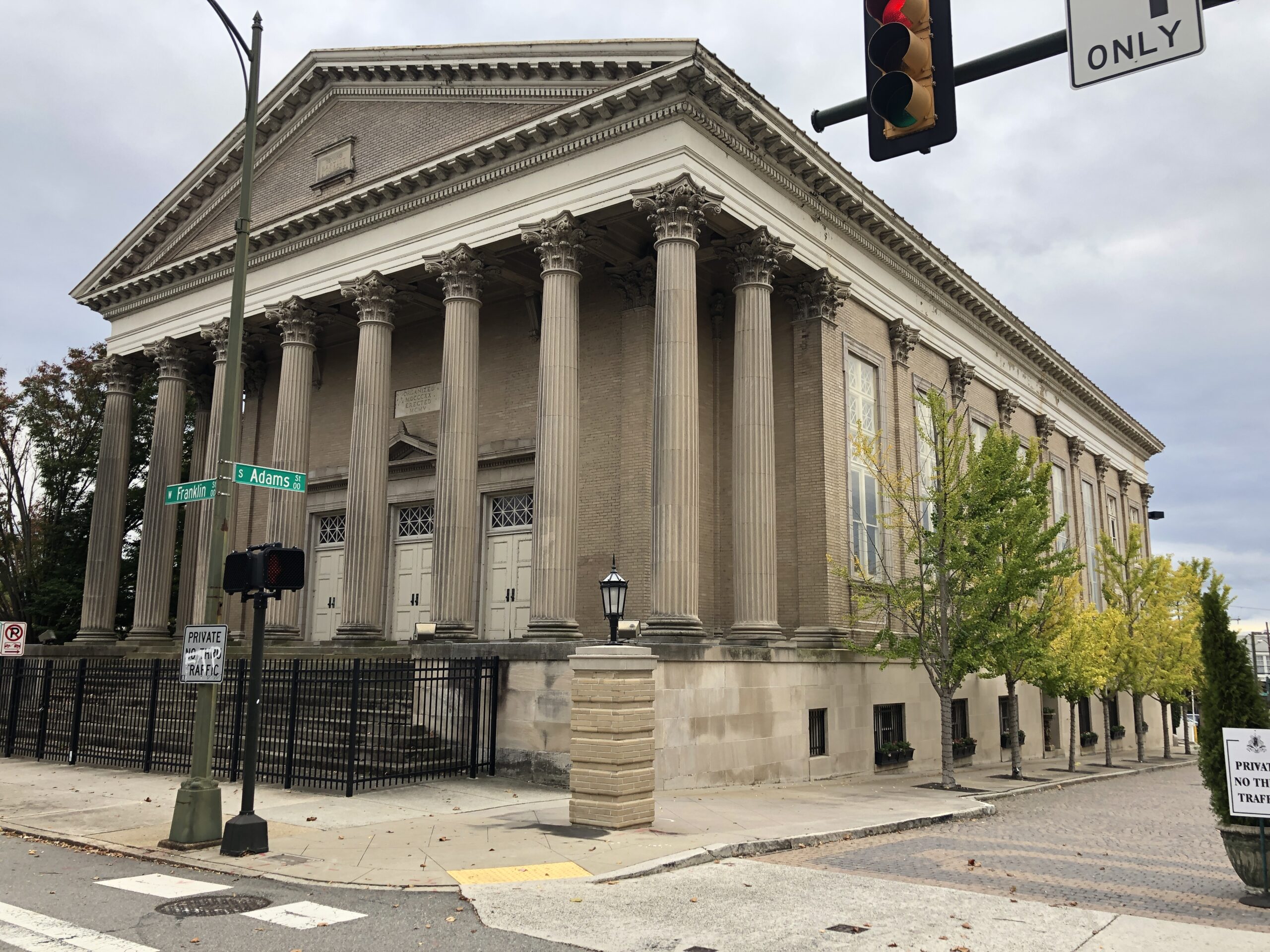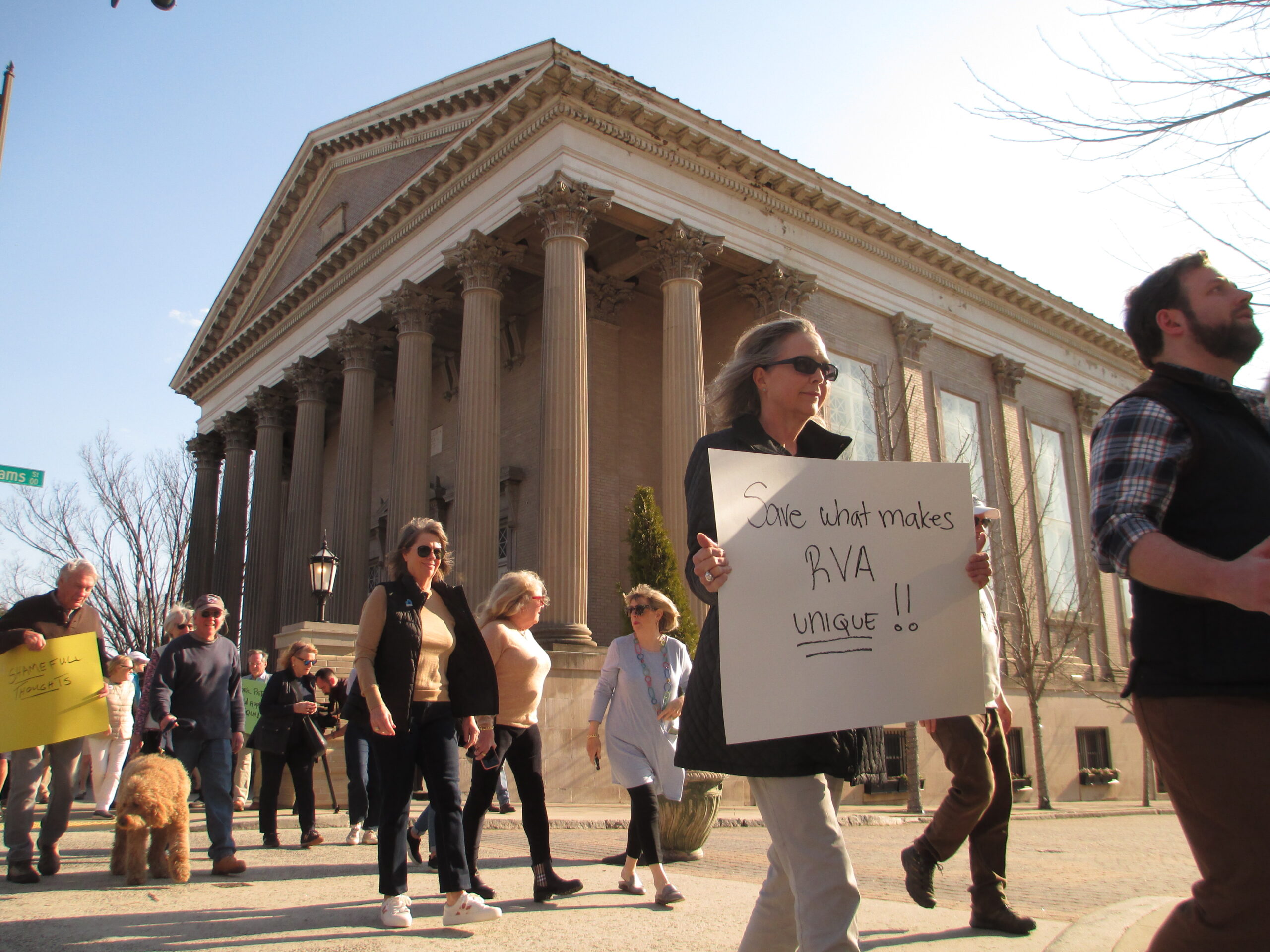The century-old Second Baptist Church building beside The Jefferson Hotel will be allowed to stand for at least a little while longer.
The hotel’s owner, which also owns the former church building at 13 W. Franklin St., has agreed to hold off on its plan to demolish the structure for three months while other options are explored, City Councilmember Stephanie Lynch confirmed.
Lynch, who voiced opposition to the plan in a council meeting earlier this month, said city officials including councilmembers Andreas Addison and Ellen Robertson reached what Lynch called a gentleman’s agreement with Bill Goodwin, the head of ownership group Historic Hotels of Richmond.
Lynch, who was not a participant in the meeting, stressed that the arrangement is not legally binding but is meant to allow stakeholders more time to explore options for potentially preserving the neoclassic-style building, which is considered architecturally significant.
“I wouldn’t stick the flag in the ground and say that victory has happened yet,” Lynch said. “But if anything, at least we stopped it for now.”
Lynch said the meeting was held Feb. 18, about a week after preservationists brought attention to the issue with a press conference and rally in front of the building.
The events followed a change in the city’s position to allow the demolition to proceed without additional approvals, based on a council decision from 30 years earlier, when Historic Hotels first sought to tear down the structure.
A closed session on the issue was held the following Monday, and Lynch said the meeting with Goodwin was requested by Robertson, whose Sixth District includes the church building property, and Addison, who chairs the council’s Land Use, Housing and Transportation Standing Committee.
A call to Robertson late Friday was not returned in time for this story. Attempts to reach Goodwin’s CCA Industries for comment have been unsuccessful.
Lynch said subsequent meetings were held last week with stakeholders including Historic Richmond, which has advocated for preserving the building and has said it offered to work with the hotel to assist with an adaptive reuse of the building, with past proposals including a fitness center, pool, offices and housing.
The nonprofit has said it previously reached out to the hotel and was told that the demolition was sought due to structural issues with the building and “an inability to find an economically viable use.” The hotel has cited structural deterioration and safety concerns in its requests to permit the demolition.
In the weeks since the press conference and rally, workers have been seen moving boxes out of the building, with moving trucks parked beside it. Preservationists feared that demolition was imminent, and Lynch said her understanding was that it was actively moving forward.
Last week, the city’s Commission of Architectural Review adopted a statement of opposition to the demolition request, which the same body had rejected in 1992. Historic Hotels appealed that decision to the then-City Council, which reversed the commission’s decision and approved a required certificate of appropriateness.
While city planning staff initially said that a new certificate from CAR would be needed when Historic Hotels revived its request last fall, the city attorney’s office has since determined that the previous certificate is still valid because the approval from the council did not specify an expiration date. Such certificates typically expire after a year, staff said.
Reinforcing its 1992 opposition, the CAR statement read, “…The Commission of Architectural Review of 2022 would like to formally express its continued opposition to this demolition, and believes the owner should demonstrate that every possible solution has been explored, as demolition is final, cannot be reversed, and will negatively impact the historic, architectural inventory and character of this Old and Historic District.”

A photo distributed by Historic Richmond shows the interior of the former church building, which The Jefferson Hotel has been using for storage.
Built in 1906, the sanctuary building was designed by William Noland of Noland and Baskervill, a predecessor of the present-day Baskervill architecture firm, and was based on the same Roman temple that Thomas Jefferson modeled the Virginia State Capitol building after.
The building is part of Richmond’s West Franklin Street Old and Historic District and is listed on the National Register of Historic Places as part of the Grace Street Commercial Historic District.
While she acknowledged Historic Hotels has a right to demolish the building as its property owner, Lynch said she hopes that an incentive can be offered to encourage it to at least preserve the building’s columned portico, if not the entire structure.
“At the end of the day, it’s a business decision. We certainly don’t have a stick to wave, so we need to create a carrot,” Lynch said.
Noting the hold on the demolition is temporary, she added, “I do believe it is incumbent upon us to keep up the pressure, so to say, because it’s not a done deal.”
The century-old Second Baptist Church building beside The Jefferson Hotel will be allowed to stand for at least a little while longer.
The hotel’s owner, which also owns the former church building at 13 W. Franklin St., has agreed to hold off on its plan to demolish the structure for three months while other options are explored, City Councilmember Stephanie Lynch confirmed.
Lynch, who voiced opposition to the plan in a council meeting earlier this month, said city officials including councilmembers Andreas Addison and Ellen Robertson reached what Lynch called a gentleman’s agreement with Bill Goodwin, the head of ownership group Historic Hotels of Richmond.
Lynch, who was not a participant in the meeting, stressed that the arrangement is not legally binding but is meant to allow stakeholders more time to explore options for potentially preserving the neoclassic-style building, which is considered architecturally significant.
“I wouldn’t stick the flag in the ground and say that victory has happened yet,” Lynch said. “But if anything, at least we stopped it for now.”
Lynch said the meeting was held Feb. 18, about a week after preservationists brought attention to the issue with a press conference and rally in front of the building.
The events followed a change in the city’s position to allow the demolition to proceed without additional approvals, based on a council decision from 30 years earlier, when Historic Hotels first sought to tear down the structure.
A closed session on the issue was held the following Monday, and Lynch said the meeting with Goodwin was requested by Robertson, whose Sixth District includes the church building property, and Addison, who chairs the council’s Land Use, Housing and Transportation Standing Committee.
A call to Robertson late Friday was not returned in time for this story. Attempts to reach Goodwin’s CCA Industries for comment have been unsuccessful.
Lynch said subsequent meetings were held last week with stakeholders including Historic Richmond, which has advocated for preserving the building and has said it offered to work with the hotel to assist with an adaptive reuse of the building, with past proposals including a fitness center, pool, offices and housing.
The nonprofit has said it previously reached out to the hotel and was told that the demolition was sought due to structural issues with the building and “an inability to find an economically viable use.” The hotel has cited structural deterioration and safety concerns in its requests to permit the demolition.
In the weeks since the press conference and rally, workers have been seen moving boxes out of the building, with moving trucks parked beside it. Preservationists feared that demolition was imminent, and Lynch said her understanding was that it was actively moving forward.
Last week, the city’s Commission of Architectural Review adopted a statement of opposition to the demolition request, which the same body had rejected in 1992. Historic Hotels appealed that decision to the then-City Council, which reversed the commission’s decision and approved a required certificate of appropriateness.
While city planning staff initially said that a new certificate from CAR would be needed when Historic Hotels revived its request last fall, the city attorney’s office has since determined that the previous certificate is still valid because the approval from the council did not specify an expiration date. Such certificates typically expire after a year, staff said.
Reinforcing its 1992 opposition, the CAR statement read, “…The Commission of Architectural Review of 2022 would like to formally express its continued opposition to this demolition, and believes the owner should demonstrate that every possible solution has been explored, as demolition is final, cannot be reversed, and will negatively impact the historic, architectural inventory and character of this Old and Historic District.”

A photo distributed by Historic Richmond shows the interior of the former church building, which The Jefferson Hotel has been using for storage.
Built in 1906, the sanctuary building was designed by William Noland of Noland and Baskervill, a predecessor of the present-day Baskervill architecture firm, and was based on the same Roman temple that Thomas Jefferson modeled the Virginia State Capitol building after.
The building is part of Richmond’s West Franklin Street Old and Historic District and is listed on the National Register of Historic Places as part of the Grace Street Commercial Historic District.
While she acknowledged Historic Hotels has a right to demolish the building as its property owner, Lynch said she hopes that an incentive can be offered to encourage it to at least preserve the building’s columned portico, if not the entire structure.
“At the end of the day, it’s a business decision. We certainly don’t have a stick to wave, so we need to create a carrot,” Lynch said.
Noting the hold on the demolition is temporary, she added, “I do believe it is incumbent upon us to keep up the pressure, so to say, because it’s not a done deal.”






This whole thing just reeks of political backroom maneuvering and influence pedaling, let’s hope reason prevails.
there are several roads to reason
Yes Bruce is right but very few of those roads ever run through Richmond City Hall!
If Baskerville & Co. still have the plans someone could just as easily build a new building at a prime location. Maybe a law firm or some corporate headquarters. VCU enjoys spending money. This building might look nice in Monroe Park or on the bank of the James River.
That would be the most cost prohibitive solution. There’s a reason they don’t build em like that anymore, and the word “easily” would not be used in the process.
Since when is cost a factor with VCU? Only when they want the publics’ money. That monstrosity of an art building at Broad and Belvidere streets cost millions and millions. They could easily build this classic building in Monroe Park, use it for a public lecture hall. Each day at 12noon a VCU professor will give a one-to-two-hour presentation for public consumption. Free of charge. They could do this at its present location and the Jefferson Hotel guest can benefit.
What fantasy world do you live in where these are viable solutions?
The owners have been searching for a viable solution for 30 years!
I’m trying to throw something out there maybe they haven’t thought of.
This building makes me think of great thinkers/scholars from a time when they would share their knowledge in a building such as this. I can see people sitting about the steps and on a grassy lawn, under a shade tree, discussing/debating a lecture just given, by a scholar, about the shape of things in the world, even if it was flat. Monroe Park would supply such a setting. We’ll let you have your food trucks, too.
Former President of the United States James Monroe was no dummy. Why not make this a “park of knowledge?” This would benefit the community more than the history of this park I’ve known.
They could turn this building into something incredible and new. Ask the people of Richmond what they need. What’s an important niche this building could fulfill that would make the Jefferson famous beyond the borders of our city? An Orangery, like the one in Kew Gardens, UK, with classical music brunches? Or something more young and relevant, like a live music venue with national acts. Imagine the famous people who would perform there and stay at the Jefferson. It could be expanded with an outdoor beer garden and purge the stodgy vibe that some now associate with the Jefferson. Show… Read more »
Performance spaces are typical suggestions made by people who don’t know the numbers.
It’s a great building, and I’d like to see it saved, and used — but someone needs to have a use, not “find a use” or “force a use”— even office would be financially challenging.
Thinking only about the bottom line negates the intrinsic value of this historic building and the opportunity the Jefferson has to come out as a forward-thinking hero in this. If they’re thinking only about the numbers (and I do know the numbers; I managed The Flood Zone in mid-1990s) have they considered the loss of business and reputation that would come from destroying this building? The loss or preservation of that building will stand as a permanent testimonial to the Jefferson as a business. It will be an advertisement to the people of Richmond, should we dine, have drinks, or… Read more »
exactly–people stay at the jefferson because its a historic, architecturally significant, five star hotel. Selling that vision is harder when you are actively destroying historic, architecturally significant buildings across the street.
But who foots the bill for that?
It would be a money making venture, an investment for the company and a win-win for the hotel. Imagine a concert venue with a beautiful hotel as part of the package for national acts. They could bring in virtually anyone. It’d be like Richmond’s version of the Bowery Ballroom. It would definitely give the Jefferson a new vibe.
Sounds good. MAYBE, just maybe… all this attention will draw the interest of some entity that is looking for a building of this kind — and maybe the owner won’t mind selling.